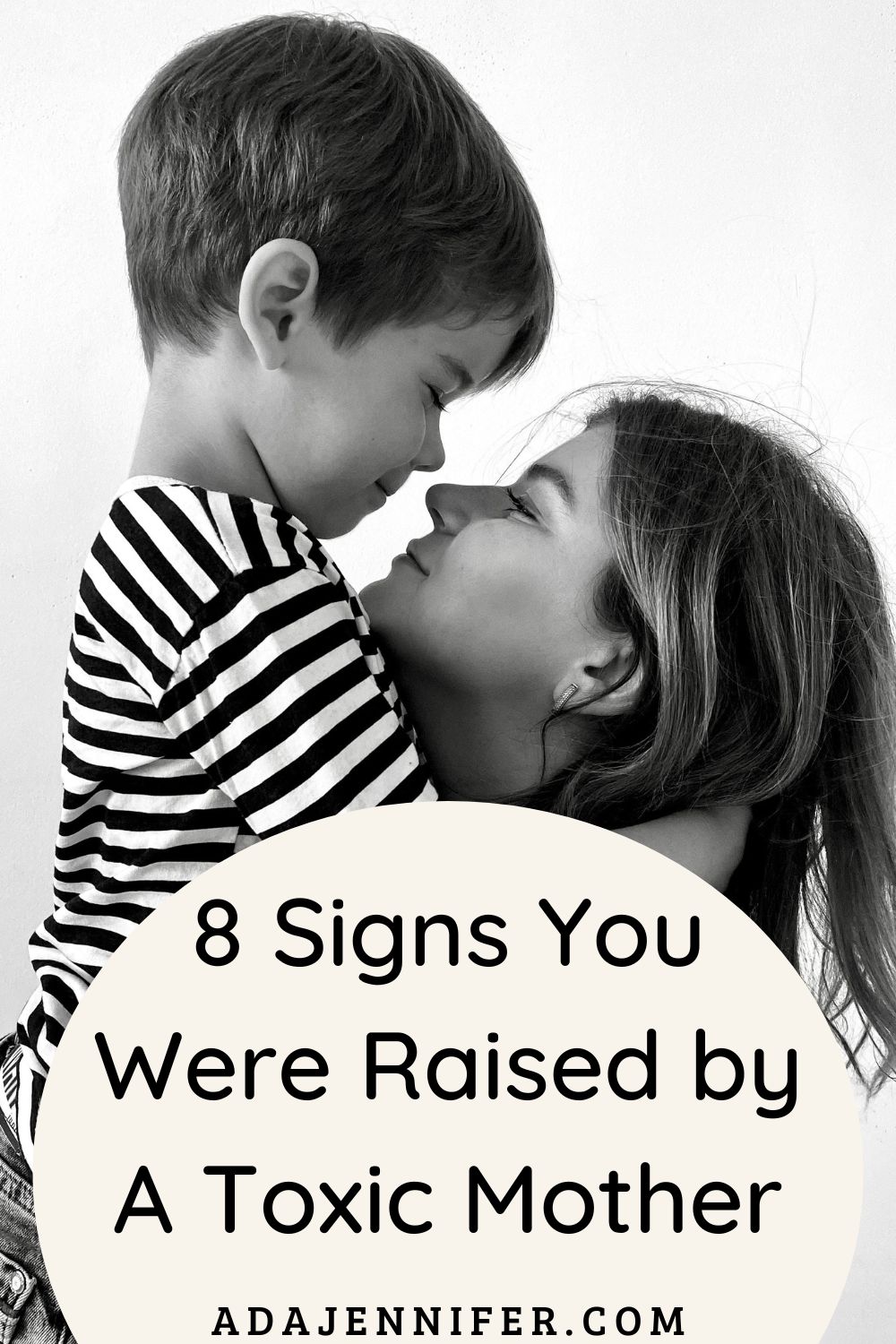8 Signs You Were Raised By A Toxic Mother

How do you know if your mom is toxic? We’ll help you with 8 signs you were raised by a toxic mother! If you do relate to them; it’s time you move away from her!
Maternal toxicity is pretty prevalent, and it has been prevalent for a long, long time. The only difference is people have started to talk about it more openly. Individuals have started to choose their mental health over their parents or any other toxic relationship, as a matter of fact.
Amen to that! It can be hard to stand up for yourself against your parents, especially your mother. You are always conflicted and judged by society. It makes you question whether you have made the right choice or are at fault somehow.
Always remember, your parents gave you this life, but it doesn’t owe you. At the end of the day, it still remains your parents’ choice to bring you into this world. You can be thankful for the life they gave you, but it shouldn’t enslave you into misery and years of mental trauma.
If you think you have a toxic mother, chances are your mother has given you severe traumas, whether intentionally or not, knowingly or unknowingly.
Plus, society never lets you have a moment of clarity; it’s always ready to judge, question, criticize, and badmouth you— always too soon without knowing your story. I empathize with that!
I understand you don’t want to blame your mother, and that’s probably why you are searching for signs of whether “is my mom toxic or am I overreacting.”
This article will unfold the signs of a toxic mother and how it affects your mental health, personality, and overall existence.
Of course, you can overcome parental trauma and toxicity, but it will take time— you will have to set firmer boundaries and prioritize yourself on a selfish level; we are here with you.
Is my mom toxic? Eight signs of a toxic mother
When a relationship that’s supposed to nurture you as a child becomes toxic, it becomes difficult to understand and validate what you feel and how to process what you feel. Welcome to an article that many can relate to but few talk about.
This parental toxicity is so deep-rooted within our society that it can go heavily unnoticed— it may even force us to accept and normalize what we go through as a child, teenagers, or adults.
“She is your mother, she knows what’s best for you!”
“So, what if she yelled at you and hit you; you probably must have done something to rile her up.”
“A mother’s heart is pure; she would never harm her child.”
While your mother’s toxic behavior slowly crumples your self-esteem, you are bound to be lost in the abyss, i.e., depression and anxiety, with no understanding of whom to blame and how to undo years of damage.
Not all mothers have a pure heart; some can be mentally draining or abusive. Of course, toxicity doesn’t always come from an evil mind. It can also be a result of years of generational trauma. The keyword is “normalized.” Your mother may be toxic, and she might not even know it.
Accepting the fact that “my mom is toxic!” is the first step to healing yourself from toxic motherhood
Here’s how you can identify toxic mother signs— 8 characteristics of a manipulative and abusive mother!
If you have questioned,
“What are the traits of a toxic mother?”
“My mom is toxic or am I overreacting?”
“Signs of a bad mother”
“Signs your mom hates you.”
“My mother is crazy!”
These 8 negative traits of your mother will tell you a lot about your bad relationship with your mother!
1. She controls every aspect of your life.

One of the most toxic mother traits is: They always want to assert control over you; that’s how they can dominate every aspect of your life and throw their perception on you with force so strong it becomes suffocating.
There can be several reasons why your mother may want to have control over you:
a) She was raised in the same society, with the same laws and parenting techniques. Let’s just say your parent’s generation, especially the millennial parents, weren’t very liberating or open-minded.
They accepted what was thrown at them without ever questioning or doubting the foundation of their upbringing. So, it’s common for them to pass that toxic upbringing onto you.
b) She is over-protective: That’s the thing about love; it can quickly become toxic when you don’t understand the true definition of love.
c) She plays by the book: For some mothers, their religious or societal practices are first and foremost. Your mental health or personal choices don’t matter!
These are just a few reasons your mother may want to control you. For all we know, your mother may be a controlling person by her own personal choice. Some people enjoy the power they have over others.
Regardless of the reason, parental love or care should never be compared to controlling one’s whole life. Controlling someone is toxic; it can never be love.
So, if you are questioning “is my mom toxic?” and you know that she controls every aspect of your love. It’s not care; it’s toxicity!
“Love: My baby, why do you love playing games so much? Should I look for a coach; I think you are good at it!”
“Control: Why are you PLAYING GAMES!? Would you only listen to me when I break this thing down? FINE! I’ll break it down if that’s what it takes for you to quit playing. It’s for your own good!”
A toxic mother would want to have control over everything you choose—
- Who you should talk to and who you shouldn’t.
- Who you should befriend and who you shouldn’t.
- What you should wear and what you can wear.
- If you can wear lipstick or not.
- If you can talk to boys/girls/trans/other genders or not.
- When you can go out and when you cannot.
- What careers should you pursue?
They throw so many restrictions on you in the name of “I’m your mother, I know what’s best for you” that it becomes difficult to breathe.
What are signs of a toxic mother? A controlling person may use physical violence or emotional blackmail to ensure you listen and agree to every word they say.
“Why would you not listen to me? DO YOU WANT ME TO DIE?”
“You are an ungrateful child! You don’t deserve my love or anyone’s love.”
“You are a disgrace to this family.”
She might physically harm you or lock you inside your room to get her way! If your mother doesn’t let you make a single decision for yourself and becomes visibly toxic when you choose/decide something for yourself, RUN!
Of course, parents are there to guide you through life without wanting any harm to you. Always remember, there’s a difference between “teaching you how to fly while also being careful” and “cutting your wings down to avoid the risk of flight.”
2. Manipulative mom
Manipulation is hard to identify, yet the pattern is so easy to trace. You just have to open your eyes, and the truth will be right before you. How often has your mother made you feel guilty or sad about things/choices/decisions that made you happy inside out?
Manipulative mother examples:
Most of the time, your mother would use guilt to have her way in your life. Here’s an examples and this still happens to me:
First scenario:
Child: “Mom! I’m going on this trip… I’m so excited about it!”
A supportive mother: “My baby, I’m so happy you are enjoying your life. Your age is all about exploring what life has to offer. Don’t you ever stop!”
A toxic mother: “Sure, go ahead and enjoy your extravagant vacation while your mother sits in the house, alone and lonely. Might find me dead when I return but who cares?”
Scenario two:
Child: “Mom, I want to live independently and learn life!”
Toxic moms: “Yes leave me just like your dad did! This is what I get after giving up my whole life to provide you shelter and a healthy life? Sure, leave me alone at my own mercy.”
In both scenarios, this mother is putting her child into guilt to stop them from leaving her, this is one of the biggest toxic mother traits.
While we care about her feelings, she shouldn’t take away your individuality and solely depend on you. Instead, a secure mother would find her individuality instead of forcing her dependency on you.
Guilty is not the only way a mother can manipulate her kids. A toxic mother uses anger, fear, shame, family, and what not to bring her child into her web.
Signs of a manipulative mom
Have you seen the movie tangled? Rapunzel’s mother used to manipulate her daughter using fear. She banned her daughter from ever going out in the world by making her fear the very world she loved. A mother who loves and cares about you wouldn’t stop you from exploring and finding your own identity in this world despite knowing what the world holds.
After guilt, gaslighting is another way to manipulate someone. Now again, she might be doing this unintentionally or out of fear; but she doesn’t have the right to do so. She doesn’t have the right to take away your own experiences, failure, happiness, and chances of success.
“My mom is toxic and manipulative! What to do?” MOVE AWAY! I know, ending relationship with your mother can be hard. However, you are not obliged to stay with someone who wants to treat you like a puppet and damage you until you are physically and mentally tired!
3. She judges you and criticizes you.

The only fuel that directly crumples your confidence and self-esteem— is judgment from your family. It’s so common and normalized that we may never even know the real reason why we are so uncomfortable in our skin is because of our parents.
Have you seen the series F.R.I.E.N.D.S? Monica’s mother was a breathing example of a judgmental mother. She judged every aspect of Monica’s life— she would belittle her career, looks, boyfriend choices, friends’ choices, and so on. Her behavior is just the tip of the iceberg; it’s worse than what’s shown on television.
Judgmental mothers would try to criticize you through whatever means, and they can do so for multiple reasons.
a) Some mothers want power over their children. What’s better than walking over their self-esteem.
b) They may use judgment to manipulate you and keep you under their wing.
c) Some mothers judge their daughters because of jealousy. Yes. The jealousy between mother and daughter is very common.
d) Some believe “appreciation can bring conceit.”
e) Some always have high expectations from their children; such is the case with most Asian countries. Those kids aren’t born with a spoon full of happiness; they are born with a spoon full of expectations.
The worst part of living a judgmental childhood is that it doesn’t leave you alone when you grow up. The lack of confidence, low self-esteem, and indecisiveness make life all the more difficult.
“You are fat. No one would marry you at this rate!”
“You should try some brightening serum. That face is so dull and dark.”
“What are you wearing? It’s comical.”
“With that hairstyle, good luck with your relationships.”
“Your career is a joke.”
“I don’t care if you have a masters in cooking; I don’t have faith you can pull this party off. No offense.”
Again, this is just the tip of the iceberg. The reality is far more crushing and disheartening.
4. She doesn’t appreciate you.
While your mother is ready to critically judge you at any given time, she is rarely available to appreciate you and boost you for your achievements. For a toxic mother, your achievements are insignificant and of zero value.
A secure mother would appreciate you for every little thing. In better words, she celebrates your existence, not just your achievements. For her, your breathing existence is a beautiful encounter, and those achievements are just the cherry on top.
On the other hand, a toxic mother would make you feel insignificant in your own skin and accomplishments. She would make you feel incompetent, incapable, and insufficient. No accomplishment of yours will ever be enough for her.
This constant demotivation would make you feel unworthy and of no use. You might as well start to see yourself through her lens and stop trying new things.
It’s not weak to seek validation and approval from our parents.
5. Mother-daughter jealousy
Sounds shocking, right? However, this is possible in multiple households, especially when the daughter reaches a prime age in her life with success and beauty both in her hands.
An aging mom with a midlife crisis will often be insecure about her looks and the changes age brings into her life. The insecurity may turn into jealousy towards her very own daughter.
Such mothers would often be engulfed in
- Belittling their daughters,
- Pulling her down through negative comments,
- Criticizing or overlooking her achievements,
- Highlighting her drawbacks and boasting about her own achievements to have a sense of achievement.
“I’m 40 and I still don’t need retinol at this age. Look at her using all sorts of chemicals to look young. Haha! Girl, no chemical can make you beautiful, beauty comes from within.”
“I cannot believe you are thicker than me! I’m your mother and I’m 45 years old! People might get confused about who the mother is between us, please!”
“Yes, she got a promotion, but who cares? Ask her if she’s got a boyfriend!”
Your looks may not be the only reason why your mother can be jealous of you. She can be jealous of your career, achievements, life goals, boyfriend/husband, or the happy life you have led.
6. She unleashes her emotions on you!

For a toxic mother, her child is the easiest and the most indebted target! She can scream at you, beat you, blame you, and nobody would say a word against your mother. Some parents believe you should accept their ill-treatment since they have given you food, shelter, clothes, and a life.
However, this logic is flawed and toxic in its own existence. Just because they have provided for you doesn’t mean you are indebted to them. You shouldn’t accept their behavior to be normal.
If you weren’t the reason for her anger, you shouldn’t be the receiving end of her outburst; as simple as that! Upon clarification, your mother would still somehow blame you for the things that have no reason for this argument.
Dealing with a toxic mom is difficult, but I want you to hold your ground and fight for yourself by being strict in your decision!
7. Your mother victimizes herself!
One of the most negative traits of a mother is “victimizing herself all the time and making you the villain of her life.”
Playing by the victim card is the easiest way to manipulate, control, gaslight, and emotionally blackmail a child. I was the “villain” in my mother’s life for a long time until I realized that standing up for myself doesn’t make me the villain!
They will try to make you feel like you are the bad guy and they are the innocent ones until you start to take your own stand in this brain-numbing toxicity.
8. Physically abusive.
One of the significant “signs your mom hates you” is physical abuse.
While manipulation or judgment can easily be hidden or camouflaged, physical abuse can never be hidden under any pretense. It’s right there in front of you, demanding you to stop taking abuse from the people you love, whether parents or not!
I want you to look at your scars and choose for yourself why moving away from this relationship is a necessary step for you. You are under no obligation to stay in a household that’s hurting you physically, mentally, emotionally, financially, or socially. You don’t owe them anything!
Please remember that abuse can be physical, mental, emotional, financial, or social— and still is equally severe. Many children would compromise their mental health as long as they are not physically abused.
However, mental abuse is equally scary and traumatizing. It can leave you with multiple personality disorders, depression, failure, and anxiety.
If you deal with such toxicity daily, I want you to choose your mental peace over your mother. At this point, it’s crucial!
These were 8 qualities of a bad mother. How does it affect? Her behavior will continue to affect you and trigger you until you take your own stand towards her! Below are 8 signs you were raised by a toxic mother and how to deal with a toxic mother!
8 Signs you were raised by a toxic mother!
As said, the worst part of being with a toxic mother is that you endure its side effects most of your life until or unless you address the issue directly.
The traumas and toxicity you received during childhood reek and seep throughout your personality and adulthood; it doesn’t leave you at rest or make you feel content.
Standing up against your parents is probably the hardest decision you will ever have to make, but it’s a decision you must take! If it makes you come across as a selfish person, so be it!
Abusive mother effects on daughters can be enough to drown her down; standing up against your parents is the board you must approach to surf back and live a life that’s liberating, free, and full of happy moments.
Here are eight personality signs you were raised by a toxic mother. Remember, acknowledging your traumas is the first and foremost step to overcoming them. So, be a little courageous and accept them headstrong. We are here to guide you through it!
Below are 12 long-term effects of toxic parents:
1. Insecure attachment
How your relationship with your mother affect your romantic relationships?
In psychology, attachment is a human study that evaluates your personality traits during adulthood (attachment style) depending on your childhood and how you connected with your parents.
While a secure childhood will move you towards secure attachment, a toxic childhood will inevitably develop an insecure attachment within you.
Insecure attachment includes “anxious” and “avoidant attachment styles.” Here’s a brief of both attachment styles.
a) Anxious attachment style

“An unstable childhood results in an anxious attachment style”
In this attachment style, parents are available for their kids with uncertainty, depending on their mood or their child’s achievement. The instability of a parent to provide unconditional love to their children results in an anxious attachment style.
In adulthood, this attachment style takes the face of insecurities, trust issues, jealousy, and codependency. You become clingy and constantly seek assurance because you fear that others (partners/friends) will stop loving you at any moment.
At the same time, you become a people pleaser or try to become the best in everyone’s eyes because you believe love is something that only comes when you have achieved something. Regardlessly, you constantly doubt your partner’s love and their whereabouts— you are mostly stumped with jealousy, insecurities, low self-esteem, and self-value.
Because your parents have often made you feel unworthy of love, you think you are unlovable and unworthy of others’ love. This is also why you are constantly attracted to toxic relationships— you accept your partner’s toxicity and continue to cling to the relationship because that’s all you learned as a child.
Do you think you have developed an anxious attachment style because of your toxic mother? If so, please reach out to a professional therapist. Otherwise, your insecure attachment style will continue to transform you into a toxic person/partner!
b) Avoidant attachment style
On the contrary, the avoidant attachment style differs entirely from the anxious one. While an anxious attachment style’s coping mechanism is “being clingy and needy,” an avoidant person’s coping mechanism is “to cut ties and be emotionally unavailable.”
Kids with this attachment style were often provided with shelter and food but never love. Their emotions were ignored, played with, laughed at, and mocked until they decided to hide it all from the world.
During adulthood, avoidants are usually distant from people and may appear cool and egotistic on the outside. In reality, they are simply scared to release their emotions and be loved because they believe people are just as mean as their parents.
So, it’s pretty standard for avoidants to avoid, ghost, or emotionally desert other people (their partners/friends) as well. Such people are often confused or concluded as narcissists. However, avoidants aren’t narcissists, they are simply individuals who fear love and run away from love because they have never experienced love.
Avoidant attachment style is challenging to overcome, but not impossible. Being vulnerable and allowing someone into your heart again will be the most challenging step of your life, but it will be worth it! However, you will need professional help to overcome your insecurities and attachment style.
2. The desire to be perfect or the best in the room constantly.
Welcome toxic parenting that only loves and appreciates you when you achieve something big. So, it becomes your way of living— you constantly live to become perfect so people will love and appreciate you. Failing to do so makes you feel miserable and worthless.
No, “this desire to be perfect” is not driven or motivated! Please, don’t consider this toxic thought a drive to reach perfection. Perfection is a delusion; being perfect is humanly impossible and for all good reasons.
Our flaws, shortcomings, and failures define us as breathing human beings, constantly working on themselves to become better, never perfect!
I have been a victim of “wanting to be the best/perfect in the room,” It has only transformed me into an envious and jealous person. The truth is, there are all sorts of people with different capabilities and caliber.
You might be good at science; they might be good at dancing— both are great at what they do! However, a person who desires to be the best everywhere will automatically feel jealous of the other talented person and would somehow want to surpass them, welcoming toxic competitiveness.
How can a non-dancer ever surpass a professional dancer? When this competitive and “wannabe perfect” person cannot surpass the dancer; he feels worthless and insignificant despite being so talented himself.
It’s a vicious cycle!
- They never rest because they constantly try to be the best in the room. They are constantly working on new hobbies and new talents.
- Their happiness or mood depends on their value in the room. If they are best; they are happy. If someone surpasses them, their mood is automatically ruined and sour.
- Once they realize they are not better than certain people, they feel insignificant and worthless.
- When they feel worthless, they think nobody would ever love such a person.
- So, they will continue to tire themselves to become perfect because they think that’s the only way people will stay with them.
Always remember, others’ achievements don’t negate or devalue your own achievements.
3. Judgmental and critical towards your own self.

Your parent’s judgmental opinion towards you runs deep within you— so much that you start to agree, accept, and judge yourself for everything that you do!
a) You become insecure and uncomfortable in your skin and body.
If they have judged your looks, color, features, or weight, you may hate your own body and have made a prejudice against something completely natural. You consider yourself ugly and try to hide your insecurities.
You start to believe that you are not pretty because you have gained weight, have dark skin, a long nose, short in height, etc.
“Beauty is in the eye of the beholder.”
As mainstream as it may sound, it’s true! You are unique, you are beautiful, you are pretty, and you are everything because the universe took time to create you. No one should ever make you feel ugly; if they do, you should stand up for yourself instead of agreeing. It’s their mentality that’s ugly, not you, honey!
So, embrace yourself, accept your uniqueness, and let the world be damned if they make you feel less significant.
b) You think you are incapable and bad at everything that you do!
If your parents have judged you and criticized your talent/achievements, you may lose confidence in your qualities because they have already made you feel incompetent.
Nobody is born talented, honey! We all practice and practice to become better at what we do! So, don’t consider yourself a failure just because your mother believes so! Instead, prove her wrong! She would hate every second of it!
Your mother has probably made you feel like a loser and mocked your failure. Let her know failure isn’t the end. Failure is essential to become better at whatever you do! You might not believe this, but failure is natural and comes to everyone; nobody is immune to failure. Successful people don’t quit after failing, but they do fail.
4. You adapt toxicity
When you grow up in a toxic environment, picking some of those habits becomes inevitably familiar. They are more visible when you become a mother yourself or how you treat others close to you.
These habits aren’t easily visible, but they can be felt.
- Do you judge someone for the way they look and style themselves?
- Do you analyze people with a set of beauty measures?
- Do you constantly transmit pessimist thoughts to others, especially when they try to do something new or risky?
- Do you envy other people?
- Do you agree to societal and religious norms without questioning them?
- Do you, as a man, judge other men when they wear unconventional/pretty clothes (skirts) or when they wear makeup?
- Do you, as a woman, bring down other women subtly?
So, monitor how you interact with other people and monitor your personality. Do you spread positivity around you, or is it the other way around? If you think you have become toxic, you can continuously improve!
Monitor what you say, what you do, and how you judge others. Analyze your thoughts first and then speak. If you think this particular sentence would hurt someone, refrain from doing so!
5. Anxiety and depression

“My mother triggers my anxiety.”
I’m sorry if you are dealing with anxiety and depression because of your mother. People who grow up in a toxic environment often develop anxiety that inevitably affects them mentally and physically.
Please leave the place if you still live in that toxic environment; it will continue to trigger your panic attacks and fuel your depression. Your low self-esteem, lack of confidence, codependency, and demotivation further ignites all these symptoms.
If you continue to live with your mother, you will always struggle with finding your identity and confidence because she is the one who gave you all these insecurities in the first place.
First and foremost, leave that place! Anything would be better than living with people who mentally and physically exhaust you.
Anxiety on its own is physically damaging— it kills your energy, and you continue to live in a state of confusion and restlessness. When unmonitored, this can lead to depression. So, I urge you to leave that place and your mother right now!
“My mother is negative and depressing”
It’s not selfish to choose a happy life over your toxic mother— it’s a necessity at this point in your life.
If you have been clinically diagnosed with anxiety and depression, please seek professional help. Therapy is a great way to overcome depression; it allows you to talk to an adult who, for one, is responsible and understanding—something you didn’t receive as a child/teen/adult.
I would also suggest you take a budget-free trip to a different country. Just do it, trust me!
6. Low self-esteem and confidence

When your confidence has been stumped so hard for years, you will inevitably struggle with low self-esteem and a lack of confidence.
- You may struggle with an identity crisis.
- You find social gatherings exhausting.
- You consider yourself incompetent.
- You have lost the courage to try something new, and so on!
I want you to look in the mirror and tell yourself, “You are beautiful just the way you are.” I know this sounds cliche, but it’s true. You don’t need medals and significant achievements to feel good about yourself. Your existence alone is enough! Life’s about living to your fullest, not to impress others.
How to regain confidence?
- Be proud of whatever you do.
- Spend time doing what you love and harness those skills. Don’t do it to impress the world, do it for yourself. Do it because it makes you happy, not because it makes other people love you. Spending time doing what you love is a big kind of self-care!
- Don’t fear failure; be happy that it happened. Your failure teaches you many great lessons if you allow it to perceive that way.
- Don’t let people walk over your boundaries. Be firm when you tell people ‘NO.’
- If someone tries to put you down, ensure you shut them down. Nobody has the right to degrade or demotivate you.
- Practice self-love and self-care.
- Always remember life’s not about big things; life’s about living happy moments.
Achievement: I’m a successful actor; people love me, which is my most outstanding achievement.
Also, achievement: I live in the countryside with a cottage beside the river. I have two dogs, three cats, and two chickens. I love my life.
Achievements are subjective. So, ask yourself what you desire and get on with it! It might take years, but you take your time!
Toxic parenting can damage us in more ways than we can fathom. So, look closely and see if you are also a victim of these symptoms. If you are, you know what to do! Leave your mother and nurture your boundaries strictly. So, nobody ever tries to cross or insult them.
7. On your own priority list, you come last. Start prioritizing yourself.
“You cannot love others until you love yourself!” This life is yours first, and then the rest of the world comes, babe! It’s time you start to love and prioritize yourself more over toxicity.
8. You constantly crave assurance:
This happens because of low self-esteem and confidence that your mother crumpled on!
Four more signs you were raised by a toxic mother
- Codependency
- You attract and accept toxic partners.
- Trust issues
- You accept toxicity.
Toxic mom quotes.
Toxic bad mom quotes will give you a clearer vision of how your abusive mother perceives you as her child. Instead of love, her eyes speak of greed, disgust, and burden.
5 selfish toxic mother quotes:
“Family is supposed to be our safest haven. Very often, it’s the place we find the deepest heartache.” —Lyanla Vansant.
“A narcissistic mother is easily frustrated by a healthy independent child that they cannot control through parental emotional manipulation. —Anonymous.
“A child should never feel as if they need to earn a mother’s love.” —Sherrie Campbell.
“A child may not be able to articulate it, but children very quickly understand the dysfunctional unwritten family rules that exist in toxic families.” —Gail Meyer.
“Let’s get out of the habit of telling people, ‘ that’s still your mother, your dad, your sister!’
Toxic is toxic! You are allowed to walk away from people that constantly hurt you.” —@bynnada
Pin For Later!

